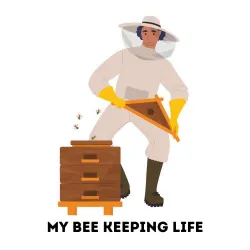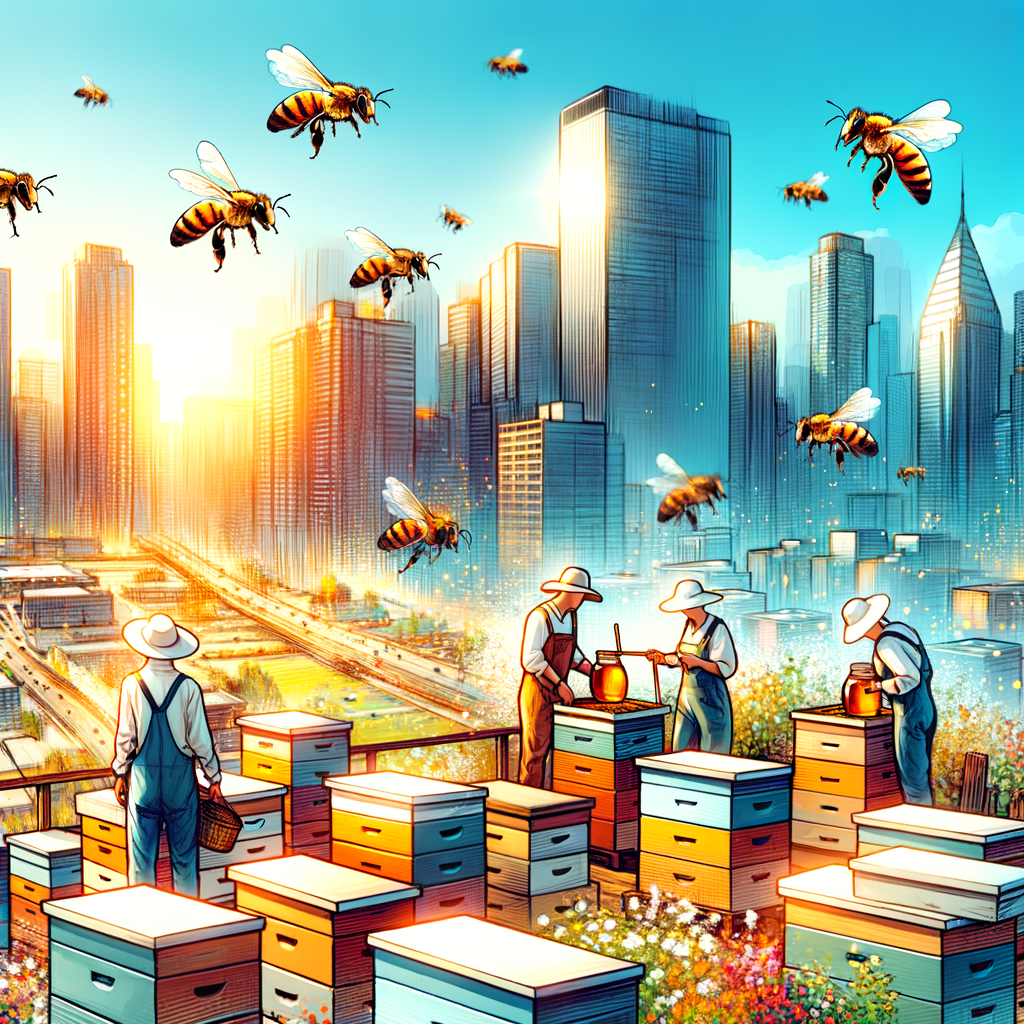
Introduction to Urban Beekeeping
Urban beekeeping is a fascinating practice that has been gaining popularity worldwide. It involves keeping bees in an urban environment, often on rooftops or in small city gardens. This blog post will introduce you to the world of urban beekeeping, its history, and the latest global trends.
-
- Definition of Urban Beekeeping
Urban beekeeping, also known as city or rooftop beekeeping, is the practice of keeping bee colonies in urban areas. This is usually done in small spaces like balconies, terraces, or rooftops. The bees are kept in hives, which are boxes with frames for the bees to build their wax honeycombs. Urban beekeepers, also known as apiarists, manage these hives, ensuring the bees are healthy and producing honey.
-
- History and Evolution of Urban Beekeeping
Urban beekeeping is not a new concept. In fact, it dates back to ancient times when Egyptians kept bees in clay pots. However, it has evolved significantly over the years. In the 19th century, Lorenzo Langstroth, an American apiarist, invented the modern beehive, which revolutionized beekeeping. The practice of urban beekeeping has gained popularity in recent years due to the decline in bee populations and the increasing awareness of their importance in pollination.
-
- Global Trends in Urban Beekeeping
Urban beekeeping is on the rise globally. In cities like London, Paris, and New York, beekeeping has become a popular hobby and a means of promoting biodiversity. According to a 2020 report, there are more than 5,000 beehives in London alone. This trend is driven by the increasing awareness of the importance of bees in our ecosystem and the desire to produce local, sustainable honey. Urban beekeeping also plays a crucial role in educating the public about the importance of bees and the threats they face.
The Role of Urban Beekeeping in Social Development
Urban beekeeping plays a significant role in social development. It fosters community engagement, promotes environmental awareness, and contributes to urban food production. Let’s delve into the concept of community beekeeping and its impact on social development.
Community Beekeeping
Community beekeeping is a practice where individuals or groups within a community manage and care for bees. It’s a fantastic way to bring people together, promote environmental stewardship, and produce local honey. Let’s look at the benefits of community beekeeping and a case study from New York City.
-
- Benefits of Community Beekeeping
Community beekeeping offers numerous benefits. It encourages community bonding and cooperation, as managing a hive requires teamwork. It also promotes environmental awareness, as bees play a crucial role in pollination. Furthermore, it provides a source of local, sustainable honey, contributing to urban food production.
-
- Case Study: Community Beekeeping in New York City
In New York City, community beekeeping has taken off in recent years. The New York City Beekeepers Association, founded in 2010, has grown to over 1,700 members. They offer classes, host events, and provide resources for urban beekeepers. Their efforts have not only increased the city’s bee population but also fostered a sense of community among residents. This case demonstrates the potential of community beekeeping in social development.
It brings people together, promotes environmental awareness, and contributes to local food production. As the case of New York City shows, it can have a significant impact on urban communities.
Urban Beekeeping and Education
Urban beekeeping is not just about honey production. It’s also about education. Let’s dive deeper into the importance of beekeeping education in cities and how it’s being implemented in schools.
- Importance of Beekeeping Education in Cities
Education plays a crucial role in the success of urban beekeeping. It’s important for city dwellers to understand the role of bees in our ecosystem. Bees are responsible for pollinating about one-third of the food we eat, including fruits, vegetables, and nuts. Without bees, our food system would be in serious trouble.
Unfortunately, many people in cities have a fear of bees, often due to a lack of understanding. Beekeeping education can help to dispel these fears by teaching people about the behavior of bees and the vital role they play in our environment. This education can also inspire a new generation of urban beekeepers, helping to ensure the future of our urban ecosystems.
- Example: Beekeeping Programs in Schools
Many schools are now introducing beekeeping programs as a way to educate students about the importance of bees. For example, the Honeybee Conservancy, a non-profit organization, has launched a program called “Bee Ambassador.” This program provides schools with beehives and a curriculum that teaches students about the importance of bees and how to care for them.
Students who participate in these programs not only learn about bees, but they also gain hands-on experience in beekeeping. They learn how to inspect hives, identify different types of bees, and even harvest honey. This hands-on experience can be a powerful tool for learning, helping to foster a deeper understanding and appreciation for bees.
Through these programs, students are not only learning about bees, they’re also learning about the importance of biodiversity and the role each species plays in our ecosystem. This knowledge can help to foster a sense of responsibility and stewardship for our environment, which is crucial for the future of our planet.
By educating city dwellers about the importance of bees and the role they play in our ecosystem, we can help to ensure the future of urban beekeeping and our urban ecosystems.
Impact of Urban Beekeeping on Economic Development
Urban beekeeping has a significant impact on economic development. One of the key areas where this impact is felt is in urban honey production.
Urban Honey Production
Urban honey production is a thriving industry that contributes significantly to the economy. Let’s delve into the economic benefits of urban honey production and examine a case study from London.
-
- Economic Benefits of Urban Honey Production
Urban honey production provides a host of economic benefits. It creates jobs, boosts local economies, and promotes sustainable practices. Urban beekeepers can sell their honey directly to consumers, to local businesses, or at farmers’ markets. This not only provides a source of income for the beekeepers but also stimulates the local economy. Additionally, urban honey production promotes sustainability by encouraging the use of local resources and reducing the need for imported honey.
-
- Case Study: Honey Production in London
London provides an excellent example of how urban honey production can boost economic development. The city is home to several urban beekeeping initiatives, such as the London Honey Company, which produces and sells locally sourced honey. These initiatives have created jobs, stimulated the local economy, and promoted sustainability. According to a report, the London Honey Company produced over 1,000 jars of honey in a single year, demonstrating the potential for economic growth in this sector.
It creates jobs, stimulates local economies, and promotes sustainability. As the case of London shows, urban honey production has the potential to significantly boost economic growth.
Beekeeping Economic Impact
Urban beekeeping is not just a hobby or a trend; it’s a significant contributor to the economy. Let’s delve into how urban beekeeping creates jobs and contributes to local economies.
- Job Creation through Urban Beekeeping
Urban beekeeping is a growing industry that has the potential to create jobs and stimulate economic growth. It’s not just about the beekeepers; there’s a whole ecosystem of jobs that are created around urban beekeeping. This includes roles in honey production, beekeeping equipment manufacturing, beekeeping training and education, and even in the hospitality industry, where local honey is a prized ingredient.
According to a study, in New York City alone, urban beekeeping has the potential to create hundreds of jobs. This is a significant boost to the local economy and can help to reduce unemployment rates.
- Contribution of Urban Beekeeping to Local Economies
Urban beekeeping contributes significantly to local economies. The sale of honey and other bee products, such as beeswax and propolis, generates income for beekeepers and supports local businesses. Furthermore, urban beekeeping promotes local food production and reduces the need for imported honey.
Moreover, urban beekeeping contributes to the economy indirectly through its positive impact on the environment. Bees play a crucial role in pollination, which is essential for the growth of fruits, vegetables, and nuts. This helps to support local agriculture and ensures a steady supply of fresh produce for the community.
Urban beekeeping has a significant economic impact, creating jobs and contributing to local economies. It’s an industry that deserves more recognition and support for its potential to stimulate economic growth and promote sustainable urban development.
Urban Beekeeping and Sustainable Urban Development
Urban beekeeping is more than just a hobby; it plays a significant role in sustainable urban development. By promoting urban agriculture, enhancing biodiversity, and serving as a case study for sustainable practices, urban beekeeping contributes to the health and vitality of our cities.
-
- Role of Urban Beekeeping in Urban Agriculture
Urban beekeeping plays a crucial role in urban agriculture. Bees are excellent pollinators, and their presence in the city helps to increase the yield of urban gardens and farms. They help to pollinate fruits, vegetables, and flowers, contributing to a diverse and healthy urban ecosystem. In fact, studies have shown that the presence of bees can increase crop yield by up to 50%.
-
- Contribution of Urban Beekeeping to Urban Biodiversity
Biodiversity is vital for a healthy and resilient ecosystem. Urban beekeeping contributes to this by providing habitats for bees and other pollinators. Bees help to pollinate a wide variety of plants, contributing to the diversity of plant species in urban areas. This, in turn, supports a wide range of other wildlife, from birds to butterflies.
-
- Case Study: Sustainable Urban Development through Beekeeping in Berlin
Berlin, Germany, serves as an excellent example of how urban beekeeping can contribute to sustainable urban development. The city has embraced urban beekeeping, with numerous rooftop hives across the city. These hives not only produce honey but also contribute to the city’s biodiversity and help to pollinate urban gardens and parks. The city government has even introduced policies to support urban beekeeping, recognizing its role in promoting sustainable urban development.
It supports urban agriculture, enhances biodiversity, and serves as a model for sustainable practices. By embracing urban beekeeping, cities can become healthier, more vibrant, and more sustainable places to live.
Challenges and Solutions in Urban Beekeeping
Urban beekeeping is a rewarding practice that contributes to social and economic development. However, it also comes with its unique set of challenges. In this section, we will explore these challenges and propose viable solutions to ensure sustainable urban beekeeping.
-
- Common Challenges in Urban Beekeeping
Urban beekeeping, like any other urban farming practice, faces a number of hurdles. Here are some of the most common challenges:
-
-
- Space Constraints: In urban settings, finding suitable space for beehives can be difficult. Buildings, roads, and other infrastructure limit the available space.
- Legal Restrictions: Some cities have laws that restrict beekeeping activities. These laws can limit the number of hives, their location, or even outright ban beekeeping.
- Pollution: Urban pollution can negatively affect the health of bees. Air pollution, in particular, can interfere with the bees’ ability to find flowers and gather nectar.
- Lack of Forage: The lack of green spaces in cities can limit the availability of nectar and pollen, essential food sources for bees.
- Proposed Solutions for Sustainable Urban Beekeeping
-
Despite these challenges, there are several strategies that can be employed to promote sustainable urban beekeeping:
-
- Maximizing Space: Rooftops, balconies, and unused lots can be transformed into beekeeping spots. Vertical beekeeping is also a viable option.
- Advocacy and Education: Advocacy can lead to changes in restrictive laws. Education can help dispel misconceptions about bees and promote bee-friendly practices.
- Planting Bee-Friendly Plants: Planting flowers that bees love can provide them with the necessary forage. This can be done in gardens, parks, and even in pots on balconies.
- Reducing Pollution: Advocating for cleaner cities can help reduce pollution levels. This not only benefits bees but also improves the overall quality of life for city dwellers.
With the right strategies, we can overcome these hurdles and ensure the sustainability of urban beekeeping.
Conclusion: The Future of Urban Beekeeping
As we draw to a close, it’s crucial to reflect on the journey of urban beekeeping and its potential future. This practice has not only proven to be a source of livelihood for many but also a catalyst for social and economic development. Let’s take a moment to summarize the key takeaways and explore the future trends in urban beekeeping.
-
- Key Takeaways on the Impact of Urban Beekeeping on Society and Economy
Urban beekeeping has been a game-changer in many ways. It has fostered community bonding, educated people about the importance of bees, and promoted environmental sustainability. Economically, it has created jobs, boosted local economies, and provided a sustainable source of income for many families. Here’s a quick recap:
| Impact | Example |
|---|---|
| Social Development | Community gardens have become learning centers where people can learn about bees and their importance to our ecosystem. |
| Economic Development | Local honey production has led to job creation and increased income for urban beekeepers. |
| Environmental Sustainability | Urban beekeeping has played a significant role in pollination, contributing to the growth of city gardens and parks. |
-
- Future Trends in Urban Beekeeping
As we look to the future, several trends are likely to shape the landscape of urban beekeeping. These include:
-
- Technological Advancements: The use of technology in urban beekeeping is expected to increase. This includes the use of apps for tracking hive health, online platforms for selling honey, and even drones for pollination.
- Sustainable Practices: As the world becomes more eco-conscious, sustainable beekeeping practices will become the norm. This includes natural pest control methods and the use of eco-friendly materials in hive construction.
- Increased Education and Awareness: More people are expected to become aware of the importance of bees to our ecosystem. This will lead to increased participation in urban beekeeping and greater support for this practice.
Urban beekeeping has a bright future ahead. With continued support and innovation, it will continue to play a vital role in our cities, contributing to social, economic, and environmental development. As we move forward, let’s continue to champion this practice and reap the benefits it offers to our society and economy.








